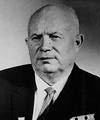
John F. Kennedy
1917-63
US President
He was the youngest candidate and first Roman Catholic to be elected President.
His Inaugural Address offered the memorable injunction: "Ask not what your country can do for you - ask what you can do for your country." As President, he set out to redeem his campaign pledge to get America moving again. His economic programs launched the country on its longest sustained expansion since World War II.
Kennedy launched an unsuccessful attempt to invade Cuba; later he confronted the Russians in the Cuban missiles crisis; signed a nuclear test ban treaty; and directed the US space agency to launch a manned flight to the moon within ten years.
To the shock of the nation he was assassinated in Dallas, Texas.
www link :
Biography
.

Jomo Kenyatta
1891-1978
President of Kenya
After returning from studies in London Kenyatta became a leader of the
Mau Mau revolt in Kenya in 1953.
Later he led the Kenyan delegation to the
London constitutional conference of 1962; became Prime Minister, and then
President in 1964.
www link :
Biography
.

Ruhollah Khomeini
1900-89
Iranian Ayatollah
Ruhollah Hendi adopted the name Khomeini in 1930. After teaching at a theological school in Qom,
he was arrested (1963) and exiled to Turkey and Iraq before moving to Paris in 1978.
Following the revolution that deposed the shah, Khomeini returned to Iran in 1979,
declared an Islamic republic, and began to exercise ultimate authority in the nation.
His rule was marked by the holding of U.S. hostages (1979-81) and by war with Iraq (1980-88).
www link :
Biography
.

Nikita S. Khruchchev
1894-1971
Soviet Leader
Member of the Politburo since 1939 he succeeded to became First Secretary of
Communist Party after the death of Stalin.
In 1956 he launched the de-stalinisation
campaign; confronted the US in the Cuban missiles crises; sent Soviet troops to
suppress the uprising in Hungary; and in 1964 was forced to resign by an increasingly
powerful opposition.
www link :
Biography
.

David Lloyd George
1863-1945
British Statesman
Chancellor of the Exchequer (1908-15) in the Liberal cabinet
of H.H. Asquith he introduced an ambitious welfare and pension programme.
In 1916 he became Prime Minister in a Coalition government and
represented Great Britain at the Paris Peace Conference, where he exercised
a moderating influence on his allies. In 1922 the Liberals, divided between
Lloyd George and Asquith, were defeated, and the Liberal Party declined as
a political force.
www link :
Biography